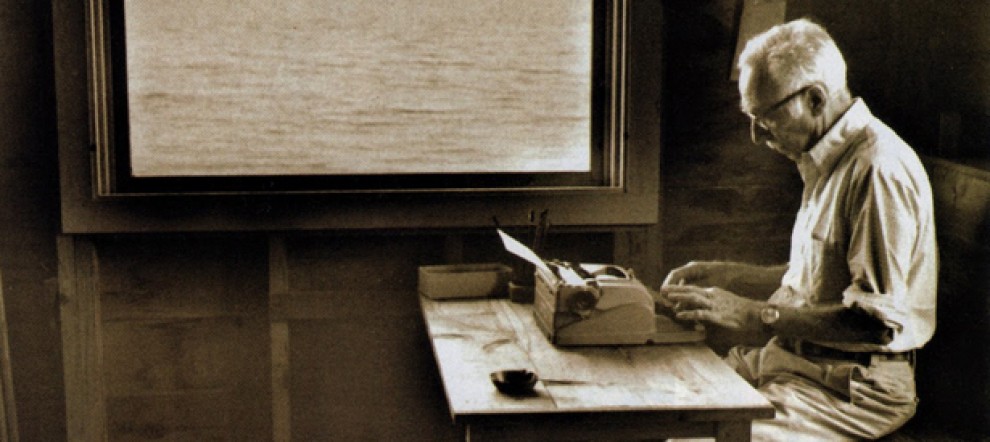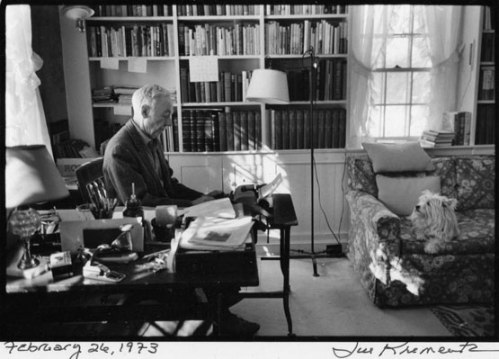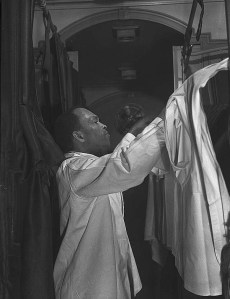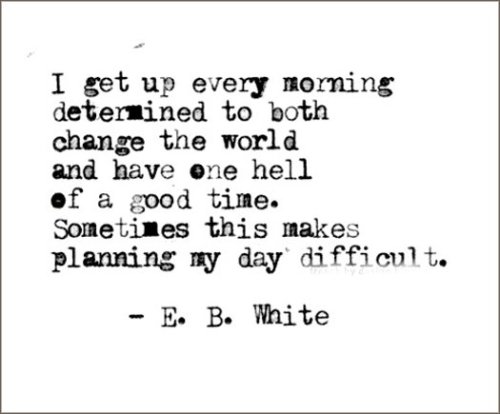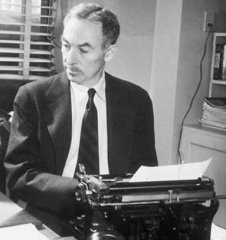 Elwyn Brooks ‘E.B’ White (1899-1985) was an American writer. Throughout his writing life he was a regular contributor to the New Yorker magazine. He was also co-author of the near legendary English Language Style Guide, The Elements of Style. He wrote a number of very successful books for children, including Stuart Little (1945) and Charlotte’s Web (1952).
Elwyn Brooks ‘E.B’ White (1899-1985) was an American writer. Throughout his writing life he was a regular contributor to the New Yorker magazine. He was also co-author of the near legendary English Language Style Guide, The Elements of Style. He wrote a number of very successful books for children, including Stuart Little (1945) and Charlotte’s Web (1952).
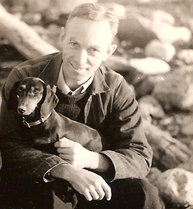 A quiet man who disliked publicity he lived and worked in New York City during most of the 1920s. He married his wife Katherine in 1929 and in the mid-1930s, six years into their marriage, they bought a 40-acre farm at North Brooklin overlooking Allen Cove on the coast of Maine. To followers of his work, his 19th-century Maine home was historic literary territory.
A quiet man who disliked publicity he lived and worked in New York City during most of the 1920s. He married his wife Katherine in 1929 and in the mid-1930s, six years into their marriage, they bought a 40-acre farm at North Brooklin overlooking Allen Cove on the coast of Maine. To followers of his work, his 19th-century Maine home was historic literary territory.
 There was a small grey boathouse on his property facing Allen Cove and it was in here that he wrote the first draft of Charlotte’s Web in 1950 together with a wealth of essays, poems, sketches and letters.
There was a small grey boathouse on his property facing Allen Cove and it was in here that he wrote the first draft of Charlotte’s Web in 1950 together with a wealth of essays, poems, sketches and letters.
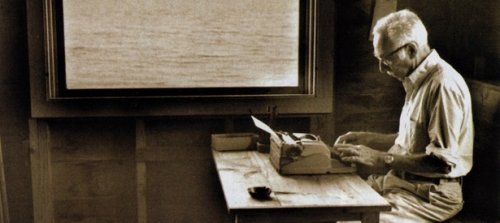
“He does most of his writing at the water’s edge in an old boathouse, sitting in Spartan solitude on a wooden bench. Writing has never come easy, and it took him years to realize that spikes were sticking in his back. Mr. White has now built himself a broader bench and screened in the boathouse and chased off the foxes that burrowed into the ground below.” (New York Times. Photograph by Jill Krementz)
Until illness slowed him down, E.B.White usually rose at 6 in the morning, started the wood fire in the black four-lidded kitchen stove, checked the action in the birdfeeder dangling outside the living-room window and peered at the broken clouds. When the sun broke through without advance notice the pencils, pens and typewriters went into action. He had a portable typewriter in his boathouse and an upright Underwood in his workroom. He liked to sip a vermouth cassis before lunch.

He talked about his writing routine in an interview for the Paris Review published in the Fall 1969 issue – I never listen to music when I’m working. I haven’t that kind of attentiveness, and I wouldn’t like it at all. On the other hand, I’m able to work fairly well among ordinary distractions. My house has a living room that is at the core of everything that goes on: it is a passageway to the cellar, to the kitchen, to the closet where the phone lives. There’s a lot of traffic. But it’s a bright, cheerful room, and I often use it as a room to write in, despite the carnival that is going on all around me. A girl pushing a carpet sweeper under my typewriter table has never annoyed me particularly, nor has it taken my mind off my work, unless the girl was unusually pretty or unusually clumsy. My wife, thank God, has never been protective of me, as, I am told, the wives of some writers are. In consequence, the members of my household never pay the slightest attention to my being a writing man – they make all the noise and fuss they want to. If I get sick of it, I have places I can go. A writer who waits for ideal conditions under which to work will die without putting a word on paper.
E.B. White was also asked if he employed any warm-up exercises to get going – Delay is natural to a writer. He is like a surfer – he bides his time, waits for the perfect wave on which to ride in. Delay is instinctive with him. He waits for the surge ( of emotion? of strength? of courage? ) that will carry him along. I have no warm-up exercises, other than to take an occasional drink. I am apt to let something simmer for a while in my mind before trying to put it into words. I walk around, straightening pictures on the wall, rugs on the floor – as though not until everything in the world was lined up and perfectly true could anybody reasonably expect me to set a word down on paper.
The interviewer then asked him about his views on disipline and the writer – The things I have managed to write have been varied and spotty – a mishmash. Except for certain routine chores, I never knew in the morning how the day was going to develop. I was like a hunter, hoping to catch sight of a rabbit. There are two faces to disipline. If a man (who writes) feels like going to a zoo, he should by all means go to a zoo. He might even be lucky, as I once was when I paid a call at the Bronx Zoo and found myself attending the birth of twin fawns. It was a fine sight, and I lost mo time in writing a piece about it. The other face of disipline is that zoo or no zoo, diversion or no diversion, in the end a man must sit down and get the words on paper, and against great odds. This takes stamina and resolution. Having got them on paper, he must still have the displine to disgard them if they fail to measure up; he must view them with a jaundiced eye and do they whole thing over as many times as is necessary to achieve excellence, or as close to excellence as he can get. This varies from one time to maybe twenty.
Finally, he made a very interesting comment in an essay first published in 1939 called ‘Progress and Change‘ – In resenting progress and change, a man lays himself open to censure. I suppose the explanation of anyone’s defending anything as rudimentary and cramped as a Pullman berth is that things are associated with an earlier period in one’s life and that this period in retrospect seems a happy one. People who favor progress and improvements are apt to be people who have had a tough enough time without any extra inconveniences.Reactionaries who pout at innovations are apt to be well-heeled sentimentalists who had the breaks. Yet for all that, there is always a subtle danger in life’s refinements, a dim degeneracy in progress. I have just been refining the room in which I sit, yet I sometimes doubt that a writer should refine or improve his workroom by so much as a dictionary: one thing leads to another and the first thing you know is he has a stuffed chair and is fast asleep in it. Half a man’s life is devoted to what he calls improvements, and yet the original had some quality which is lost in the process.
Further reading:
Notes and Comments by Author (New York Times)
